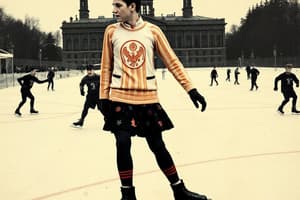Podcast
Questions and Answers
What material are ice skate blades typically made of?
What material are ice skate blades typically made of?
- Wood
- Steel (correct)
- Plastic
- Aluminum
What is the main purpose of the hollow-ground design of ice skate blades?
What is the main purpose of the hollow-ground design of ice skate blades?
- To make the blade more flexible
- To create distinct edges for gripping the ice (correct)
- To increase the weight of the skate
- To reduce friction on the ice
Which of the following is a fundamental technique in ice skating?
Which of the following is a fundamental technique in ice skating?
- Puck handling
- Balancing (correct)
- Jumping
- Shooting
What is the 'snowplow stop' technique used for in ice skating?
What is the 'snowplow stop' technique used for in ice skating?
What do crossovers primarily help skaters achieve?
What do crossovers primarily help skaters achieve?
In figure skating, what are skaters judged on?
In figure skating, what are skaters judged on?
Which of these is a type of jump commonly performed in figure skating?
Which of these is a type of jump commonly performed in figure skating?
In which skating discipline is the Stanley Cup awarded?
In which skating discipline is the Stanley Cup awarded?
What is the primary objective in ice hockey?
What is the primary objective in ice hockey?
What is a key skill for ice hockey players?
What is a key skill for ice hockey players?
In speed skating, what is the main difference between long track and short track?
In speed skating, what is the main difference between long track and short track?
What is the length of the oval track used in long track speed skating?
What is the length of the oval track used in long track speed skating?
What is a common benefit of recreational ice skating?
What is a common benefit of recreational ice skating?
What machine is typically used to resurface the ice in indoor ice rinks?
What machine is typically used to resurface the ice in indoor ice rinks?
What is an important safety measure to prevent injuries while ice skating?
What is an important safety measure to prevent injuries while ice skating?
What did early forms of ice skates consist of?
What did early forms of ice skates consist of?
Which century saw the development of metal-bladed skates, improving ice skating efficiency?
Which century saw the development of metal-bladed skates, improving ice skating efficiency?
Besides ice skates, what is a piece of protective gear commonly worn by skaters?
Besides ice skates, what is a piece of protective gear commonly worn by skaters?
What do beginner ice skating lessons typically cover?
What do beginner ice skating lessons typically cover?
What is essential for developing skills and building confidence in ice skating?
What is essential for developing skills and building confidence in ice skating?
Flashcards
Ice Skating
Ice Skating
Moving on ice using metal-bladed ice skates.
Ice Skates
Ice Skates
Allow skaters to glide across the ice; blades are steel with hollow-ground edges for grip; boots provide support.
Balancing
Balancing
Maintaining a low center of gravity and proper posture on skates.
Stride
Stride
Signup and view all the flashcards
Snowplow Stop
Snowplow Stop
Signup and view all the flashcards
Crossovers
Crossovers
Signup and view all the flashcards
Figure Skating
Figure Skating
Signup and view all the flashcards
Toe Loop
Toe Loop
Signup and view all the flashcards
Salchow
Salchow
Signup and view all the flashcards
Loop/Rittberger
Loop/Rittberger
Signup and view all the flashcards
Flip Jump
Flip Jump
Signup and view all the flashcards
Lutz Jump
Lutz Jump
Signup and view all the flashcards
Axel
Axel
Signup and view all the flashcards
Upright Spin
Upright Spin
Signup and view all the flashcards
Sit Spin
Sit Spin
Signup and view all the flashcards
Camel Spin
Camel Spin
Signup and view all the flashcards
Pair Skating
Pair Skating
Signup and view all the flashcards
Ice Hockey
Ice Hockey
Signup and view all the flashcards
Speed Skating
Speed Skating
Signup and view all the flashcards
Long Track Speed Skating
Long Track Speed Skating
Signup and view all the flashcards
Study Notes
- Ice skating is the act of moving on ice using metal-bladed ice skates.
Ice Skates
- Ice skates allow skaters to glide across the ice surface.
- Blades are typically made of steel and are hollow-ground to create two distinct edges.
- The edges grip the ice, providing control and enabling maneuvers.
- Boots provide support and ankle stability, crucial for balance and control.
- Different disciplines like figure skating, hockey, and speed skating use specialized skate designs.
Basic Techniques
- Balancing is fundamental, achieved by maintaining a low center of gravity and proper posture.
- Stride involves pushing off with one skate while gliding on the other.
- Edges are used to control direction; leaning into an edge creates a turn.
- Stopping techniques include the snowplow stop, where both skates are angled inwards to create friction.
- Crossovers are used to gain speed while turning, involving stepping over the other foot.
Figure Skating
- Figure skating involves performing jumps, spins, and other movements on ice.
- Skaters are judged on technical skill and artistic expression.
- Jumps include the toe loop, salchow, rittberger/loop, flip, lutz, and axel, each with a different takeoff.
- Spins include the upright spin, sit spin, and camel spin, varying by body position.
- Pair skating involves two skaters performing elements in unison, such as throw jumps and lifts.
- Ice dancing is a discipline focusing on footwork, timing, and musical interpretation, with an emphasis on partnership.
Ice Hockey
- Ice hockey is a team sport played on ice, involving skating, puck handling, and shooting.
- Players use hockey skates and protective equipment.
- The objective is to score by shooting the puck into the opponent's net.
- Skating skills are very important for speed, agility, and power.
- Players use different skating techniques such as forward strides, backwards skating, and crossovers.
Speed Skating
- Speed skating involves racing around an oval track.
- Skaters wear specialized speed skates with long blades.
- Two main types: long track and short track.
- Long track speed skating involves racing in lanes on a 400-meter oval.
- Short track speed skating is a pack-style race on a smaller rink.
Recreational Skating
- Recreational ice skating is a popular activity for exercise and enjoyment.
- Public skating rinks provide access for people of all ages and skill levels.
- It can be a social activity, often enjoyed with friends and family.
- Many communities offer skating lessons for beginners.
Ice Rinks
- Ice rinks can be either indoor or outdoor facilities.
- Indoor rinks use refrigeration systems to maintain consistent ice quality.
- Zambonis are used to resurface the ice, creating a smooth skating surface.
- Outdoor rinks are subject to weather conditions and temperature fluctuations.
Safety
- Wearing appropriate safety gear, such as helmets, is essential to prevent injuries.
- Following rink rules and guidelines helps ensure a safe environment.
- Being aware of other skaters and avoiding collisions is important.
- Knowing how to fall safely can minimize the risk of injury.
- Regular skate maintenance, including blade sharpening, enhances safety and performance.
History
- Ice skating has a long history, dating back thousands of years.
- Early forms of ice skating involved using animal bones attached to the feet.
- The development of metal-bladed skates in the 14th century improved efficiency.
- Skating became a popular recreational activity in Europe in the 17th and 18th centuries.
- Modern ice skating disciplines, such as figure skating and ice hockey, emerged in the 19th century.
Equipment
- Ice skates are the primary piece of equipment, with various designs for different disciplines.
- Protective gear includes helmets, knee pads, elbow pads, and gloves.
- Figure skaters may use specialized clothing that allows for freedom of movement.
- Hockey players wear full protective gear, including helmets with face masks, shoulder pads, and shin guards.
- Speed skaters wear aerodynamic suits and helmets to reduce drag.
Learning to Skate
- Beginner lessons typically cover basic techniques such as balancing, striding, and stopping.
- Practice is essential to develop skills and improve confidence.
- Learning from experienced instructors can accelerate progress.
- Many rinks offer classes for different age groups and skill levels.
- Online resources, such as instructional videos, can supplement in-person lessons.
Advanced Techniques
- Jumps and spins in figure skating require precise technique and timing.
- Advanced hockey skills involve puck handling, shooting, and tactical maneuvers.
- Speed skating techniques focus on maximizing speed and efficiency.
- Developing advanced skills requires dedication and consistent practice.
- Advanced skaters often work with coaches to refine their technique and performance.
Ice Skating Events
- Figure skating competitions, such as the World Championships and the Olympics, showcase elite talent.
- Ice hockey tournaments, such as the Stanley Cup playoffs and the Winter Olympics, are popular events.
- Speed skating events, such as the World Cup and the Olympics, feature intense racing.
- Local and regional competitions provide opportunities for skaters of all levels to compete.
- Ice shows, such as Disney on Ice, combine skating with theatrical performances.
Health Benefits
- Ice skating is a good form of cardiovascular exercise.
- It improves balance, coordination, and agility.
- Skating strengthens leg muscles and core muscles.
- It can be a fun and engaging way to stay active.
- Regular skating can contribute to overall physical fitness and well-being.
Environmental Factors
- Ice quality is affected by temperature, humidity, and usage.
- Maintaining optimal ice conditions requires careful management.
- Indoor rinks use energy-intensive refrigeration systems.
- Outdoor rinks are subject to weather conditions and may require additional energy for maintenance.
- Climate change can impact the availability and quality of natural ice surfaces.
Famous Ice Skaters
- Notable figure skaters include Sonja Henie, Dick Button, and Michelle Kwan.
- Famous hockey players include Wayne Gretzky, Gordie Howe, and Bobby Orr.
- Prominent speed skaters include Bonnie Blair, Eric Heiden, and Sven Kramer.
- These athletes have achieved success through talent, dedication, and hard work.
- They have inspired generations of skaters and contributed to the popularity of the sport.
Studying That Suits You
Use AI to generate personalized quizzes and flashcards to suit your learning preferences.




